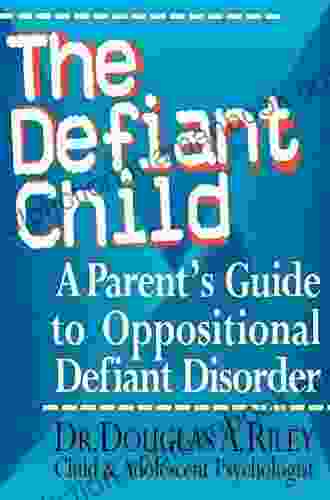Oppositional Defiant Disorder (ODD): A Comprehensive Guide for Parents

Oppositional defiant disorder (ODD) is a mental health condition that affects children and adolescents characterized by a persistent pattern of negative, defiant, and disobedient behavior. Children with ODD often display a hostile and argumentative attitude, refuse to comply with requests or rules, and may deliberately provoke or upset others. This behavior can be challenging for parents and caregivers, as they may feel frustrated, overwhelmed, and helpless.
This guide will provide parents with comprehensive information about ODD, including its symptoms, causes, and effective management strategies. By understanding the condition and its underlying factors, parents can better support their children and create a more positive and nurturing environment.
Symptoms of Oppositional Defiant Disorder
4.6 out of 5
| Language | : | English |
| File size | : | 1408 KB |
| Text-to-Speech | : | Enabled |
| Screen Reader | : | Supported |
| Enhanced typesetting | : | Enabled |
| Word Wise | : | Enabled |
| Print length | : | 258 pages |
The symptoms of ODD can vary in severity and may manifest in different ways depending on the individual child. Some of the most common symptoms include:
- Persistent disobedience: Children with ODD often refuse to comply with requests or rules, even when they know they are reasonable.
- Argumentativeness: They may argue excessively or talk back to authority figures.
- Defiance: They may deliberately do the opposite of what is asked or expected of them.
- Irritability and anger: Children with ODD may be easily frustrated or angered and may have difficulty controlling their emotions.
- Vindictiveness: They may seek revenge or retribution when they feel wronged.
- Blaming others: They may blame others for their own mistakes or misbehavior.
- Low self-esteem: Despite their defiant behavior, children with ODD may have low self-esteem and feel inadequate.
Causes of Oppositional Defiant Disorder
The exact causes of ODD are not fully understood, but research suggests that a combination of genetic, environmental, and neurobiological factors may contribute to its development.
- Genetics: Studies have shown that ODD tends to run in families, suggesting a possible genetic predisposition to the condition.
- Environment: Children who grow up in chaotic or unstable homes, experience abuse or neglect, or have poor parental supervision may be more likely to develop ODD.
- Neurobiology: Some research indicates that children with ODD may have differences in certain brain structures and neurotransmitter systems, which may affect their emotional regulation and impulse control.
Diagnosis of Oppositional Defiant Disorder
ODD is typically diagnosed by a mental health professional, such as a psychiatrist or psychologist, who will conduct a thorough evaluation and consider the child's behavior, developmental history, and family environment.
To receive a diagnosis of ODD, a child must meet specific criteria outlined in the Diagnostic and Statistical Manual of Mental Disorders (DSM-5):
- A persistent pattern of negative, defiant, and disobedient behavior lasting for at least six months.
- Symptoms occur in at least one setting, such as at home or at school.
- The behavior is excessive compared to what is typically expected for the child's developmental level.
- The behavior causes significant impairment in the child's daily functioning.
Treatment for Oppositional Defiant Disorder
Treatment for ODD typically involves a combination of approaches, including:
- Therapy: Cognitive-behavioral therapy (CBT) and parent-training therapy are effective interventions for ODD. CBT helps children learn strategies to identify and manage their emotions, challenge negative thoughts, and improve their behavior. Parent-training therapy helps parents develop effective parenting skills and strategies for managing their child's behavior.
- Medication: In some cases, medication may be prescribed to help manage symptoms of ODD, such as irritability, anger, and impulsivity.
- Support groups: Support groups provide parents and caregivers with opportunities to connect with others who understand their experiences and share coping strategies.
Parenting Strategies for Oppositional Defiant Disorder
Parenting a child with ODD can be challenging, but there are effective strategies that parents can implement to help manage their child's behavior and create a more positive and supportive environment:
- Establish clear expectations and boundaries: Children with ODD need to know what is expected of them and what consequences will occur if they do not meet those expectations.
- Set limits and enforce consequences: It is important to set firm limits and follow through with consequences when your child misbehaves. However, avoid using harsh or punitive punishments, as these can make the situation worse.
- Stay calm and positive: It can be challenging to stay calm when your child is being defiant, but it is important to remember that your child is not trying to be difficult. Stay positive and focus on the behaviors you want to encourage.
- Ignore minor misbehavior: Don't give your child attention for minor misbehavior. Instead, focus on ignoring these behaviors and providing positive reinforcement when your child behaves appropriately.
- Provide positive reinforcement: When your child behaves positively, offer praise, rewards, or privileges. This will help them understand what behaviors are expected and reinforce positive actions.
- Collaborate with teachers and other professionals: If your child is struggling at school or in other settings, collaborate with their teachers and other professionals to develop a plan to support their behavior.
- Take care of yourself: Parenting a child with ODD can be stressful and overwhelming. It is important to take care of yourself and seek support when needed.
Oppositional defiant disorder is a challenging condition that can impact the entire family. By understanding the symptoms, causes, and effective management strategies, parents can better support their children and create a more positive and nurturing environment. Remember that parenting a child with ODD is a journey, and it is important to be patient, consistent, and supportive throughout the process. With the right approach and support, children with ODD can overcome their challenges and reach their full potential.
4.6 out of 5
| Language | : | English |
| File size | : | 1408 KB |
| Text-to-Speech | : | Enabled |
| Screen Reader | : | Supported |
| Enhanced typesetting | : | Enabled |
| Word Wise | : | Enabled |
| Print length | : | 258 pages |
Do you want to contribute by writing guest posts on this blog?
Please contact us and send us a resume of previous articles that you have written.
 Top Book
Top Book Novel
Novel Fiction
Fiction Nonfiction
Nonfiction Literature
Literature Paperback
Paperback Hardcover
Hardcover E-book
E-book Audiobook
Audiobook Bestseller
Bestseller Classic
Classic Mystery
Mystery Thriller
Thriller Romance
Romance Fantasy
Fantasy Science Fiction
Science Fiction Biography
Biography Memoir
Memoir Autobiography
Autobiography Poetry
Poetry Drama
Drama Historical Fiction
Historical Fiction Self-help
Self-help Young Adult
Young Adult Childrens Books
Childrens Books Graphic Novel
Graphic Novel Anthology
Anthology Series
Series Encyclopedia
Encyclopedia Reference
Reference Guidebook
Guidebook Textbook
Textbook Workbook
Workbook Journal
Journal Diary
Diary Manuscript
Manuscript Folio
Folio Pulp Fiction
Pulp Fiction Short Stories
Short Stories Fairy Tales
Fairy Tales Fables
Fables Mythology
Mythology Philosophy
Philosophy Religion
Religion Spirituality
Spirituality Essays
Essays Critique
Critique Commentary
Commentary Glossary
Glossary Bibliography
Bibliography Index
Index Table of Contents
Table of Contents Preface
Preface Introduction
Introduction Foreword
Foreword Afterword
Afterword Appendices
Appendices Annotations
Annotations Footnotes
Footnotes Epilogue
Epilogue Prologue
Prologue Noah Eli Gordon
Noah Eli Gordon Mei Na Internet
Mei Na Internet Al Frazza
Al Frazza Tom Watson
Tom Watson G E Shpil
G E Shpil Tim Wotton
Tim Wotton Stephen Penner
Stephen Penner James Webb
James Webb Jeff Kinney
Jeff Kinney Alan Ayckbourn
Alan Ayckbourn Katherine Jeffries
Katherine Jeffries R L Smith
R L Smith Cara Bramlett
Cara Bramlett Patrick Bruskiewich
Patrick Bruskiewich Danah Logan
Danah Logan Jacki James
Jacki James Laura Boss
Laura Boss Frederick Ramsay
Frederick Ramsay Lexi Foster
Lexi Foster Karen Mcquestion
Karen Mcquestion
Light bulbAdvertise smarter! Our strategic ad space ensures maximum exposure. Reserve your spot today!

 Robin PowellThe Resistance Lily: A Captivating Historical Novel Uncovering the Secrets of...
Robin PowellThe Resistance Lily: A Captivating Historical Novel Uncovering the Secrets of...
 Chuck MitchellUnveiling the Intriguing History of the FBI: A Journey into Law Enforcement...
Chuck MitchellUnveiling the Intriguing History of the FBI: A Journey into Law Enforcement... Jerry WardFollow ·11.3k
Jerry WardFollow ·11.3k Ivan CoxFollow ·10.5k
Ivan CoxFollow ·10.5k Kelly BlairFollow ·9.3k
Kelly BlairFollow ·9.3k Octavio PazFollow ·3k
Octavio PazFollow ·3k Ernest HemingwayFollow ·2.3k
Ernest HemingwayFollow ·2.3k Elton HayesFollow ·19.2k
Elton HayesFollow ·19.2k Jon ReedFollow ·13k
Jon ReedFollow ·13k Eugene PowellFollow ·8.1k
Eugene PowellFollow ·8.1k

 Joseph Conrad
Joseph ConradExport Now: Five Keys to Entering New Markets
Are you looking to expand your business into...
 Christopher Woods
Christopher WoodsElvis Presley: The King of Rock and Roll and an Icon of...
Elvis Presley was an...

 Kelly Blair
Kelly BlairData-Driven Leadership: A Comprehensive Guide for...
In today's rapidly changing educational...

 Joe Simmons
Joe Simmons37 Stories of Canine Companionship and Courage
Dogs have been our...

 Martin Cox
Martin CoxChilling Psychological Thriller With Twist: Brace...
Prepare yourself for...
4.6 out of 5
| Language | : | English |
| File size | : | 1408 KB |
| Text-to-Speech | : | Enabled |
| Screen Reader | : | Supported |
| Enhanced typesetting | : | Enabled |
| Word Wise | : | Enabled |
| Print length | : | 258 pages |










